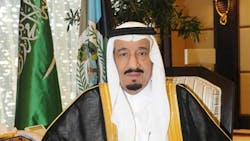Economic Diversification Goal of New Saudi Leaders
Saudi Arabia's new leadership will push forward efforts to diversify the growing but oil-dependent economy, while easing procedures for investors, senior officials said on Monday.
"The smooth transition of power to King Salman is a testament of the stability and the commitment that our leadership has," Abdullatif al-Othman, governor of the Saudi Arabian General Investment Authority (SAGIA), told a conference.
Salman acceded to the throne of the world's leading oil exporter on Friday after his half-brother King Abdullah died aged about 90.
"King Salman has been a strong supporter of promoting the kingdom as an investment destination," Othman told the Global Competitiveness Forum.
The annual event, organized by SAGIA, brings together high-ranking Saudi officials with world business leaders.
Among those attending is Eric Schmidt, executive chairman of tech giant Google.
Oil makes up about 90% of Saudi government revenues but Othman said the kingdom aims to expand the health, transport and mining sectors, along with information and communications technology.
"Already we've identified healthcare and transportation investments valued at $140 billion in the coming five years," Othman said.
There was also a plan to "transform" the financial services, tourism and real estate sectors while focusing on education and "innovation", he said.
"Now we have one of the most tech-savvy populations in the world."
'Fast-track'
Critics have complained of the administrative obstacles to doing business in Saudi Arabia but Civil Service Minister Abdulrahman al-Barrak told the gathering that "fighting red tape... is a priority."
Othman added that after detailed study the government has been trying to address investors' concerns.
"We've introduced a fast-track process that will enable investors to obtain licenses within five days", he said.
During Abdullah's "transformative" rule, Saudi Arabia joined the G20 group of major world economies as well as the World Trade Organization.
"Foreign direct investment grew at an average rate of 10% (and) increased by five-fold to reach $220 billion," Othman said.
"Productivity growth in the private sector has averaged an impressive 8.4% annually since 2005."
A 50% fall in world oil prices since last June has left Saudi Arabia projecting its first budget deficit since 2011, emphasising the need to diversify.
"We expect that the government will continue spending in the near future because we have great surpluses," despite lower projected revenues, the civil service minister said.
The kingdom's reserves are estimated at $750 billion.
Britain's Peter Mandelson, now Lord Mandelson, a former European trade commissioner, told the forum that Saudi Arabia's accomplishments are "impressive, but there is still a long way to go."
World leaders have converged on the kingdom since Friday to pay their respects.
On Monday, the latest to arrive included Canada's Governor General David Johnston. US President Barack Obama is to make a stopover on Tuesday, after cutting short a trip to India.
An AFP reporter on Monday spotted the first billboards featuring Salman as monarch. He was pictured alongside his heir Crown Prince Moqren and Deputy Crown Prince Mohammed bin Nayef, second in line to the throne.
- Ian Timberlake, AFP
Copyright Agence France-Presse, 2015
About the Author
Agence France-Presse
Copyright Agence France-Presse, 2002-2025. AFP text, photos, graphics and logos shall not be reproduced, published, broadcast, rewritten for broadcast or publication or redistributed directly or indirectly in any medium. AFP shall not be held liable for any delays, inaccuracies, errors or omissions in any AFP content, or for any actions taken in consequence.
